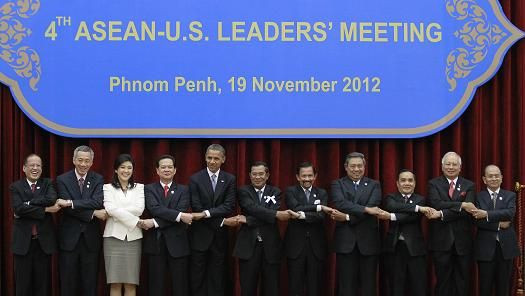Obama And China Show Why They Care About Southeast Asia At ASEAN Summit

Territorial disputes among China and Southeast Asian countries remain a concern, but economic ties are more important. That's the message from the 21st ASEAN summit that just ended in Cambodia, where China and the U.S. dominated discussions, steering talks away from confrontation over disputed islands and towards facilitating commerce.
Another focus for the newly re-elected President Barack Obama was India, with which he sought to improve bilateral relations and develop forums of of communication on several issues of mutual interest. And watching the developing relationship with some concern was China, which just announced its own power transition to a new president and prime minister and has historically been India's adversary.
And despite the handshakes at the summit, competing expectations for the Southeast Asian arena will continue to put Washington and Beijing at odds.
"It seems there is a contest between China's and the U.S.' strategic expectations for ASEAN," China's state-run Global Times said on Monday.
The article implied that the continued strengthening of relations between the U.S. and the member states of the Association of South-East Asian Nations will not be beneficial for China.
China is currently the biggest trading partner of several of the ASEAN countries, and seems to be fearful that an economic power like the U.S. could affect that status negatively.
"Obama's tour has a menacing manner, but it cannot change the reality that Southeast Asia is economically tied to China," the Global Times said, voicing what can only be an officially-sanctioned opinion.
The article also warned that improving relations with Japan would not be to the benefit of ASEAN countries, led by rising economic powers including Vietnam, a growing hub for manufacturing, and resource-rich Indonesia. "They may risk becoming the puppet of countries like the U.S. and Japan," it cautioned.
Still, as U.S.-ASEAN relations are likely to improve, the relations between Southeast Asian nations are continuing to strain.
The unavoidable topic of the South China Sea dispute was another focus of discussion. China and other nations including the Philippines and Japan have been confronting each other for months now over sovereignty on a number of small islands that, while territorially insignificant, are thought to lie at the center of vast oil and gas fields, and are in the middle of busy commercial shipping lanes.
At the beginning of the summit, China'soutgoing Premier Wen Jiabao and Cambodian counterpart Hun Sen, the gathering's host, came to an agreement with Indonesia and Malaysia that the "South China Sea Issue" should not be a barrier between China and ASEAN countries, China Daily reported.
The ASEAN Secretary-general, Surin Pitsuwan, told the press at a briefing that continued diplomatic talks between leaders were pivotal in determining agreeable guidelines to solve the South China Sea disputes
"Senior officials have done their work on the elements that would eventually go into what we would call the code of conduct, and they have been able to revive that negotiation with the Chinese," Pitsuwan said.
However, the Financial Times reported that Benigno Aquino, President of the Philippines, dismissed Pitsuwan's statement on ASEAN unity regarding the dispute. "There were several views expressed yesterday on ASEAN unity which we did not realize would be translated into ASEAN consensus," Aquino said.
But when the press asked Wen and President Obama about the South China Sea dispute, both ignored the question. That's a fitting depiction of what the region's biggest powers think of the issue: it's a problem and it could balloon into something serious, but the priority right now, as the world still deals with a global eonomic crisis, is to open Southeast Asian markets even more, and peacefully.
© Copyright IBTimes 2024. All rights reserved.






















